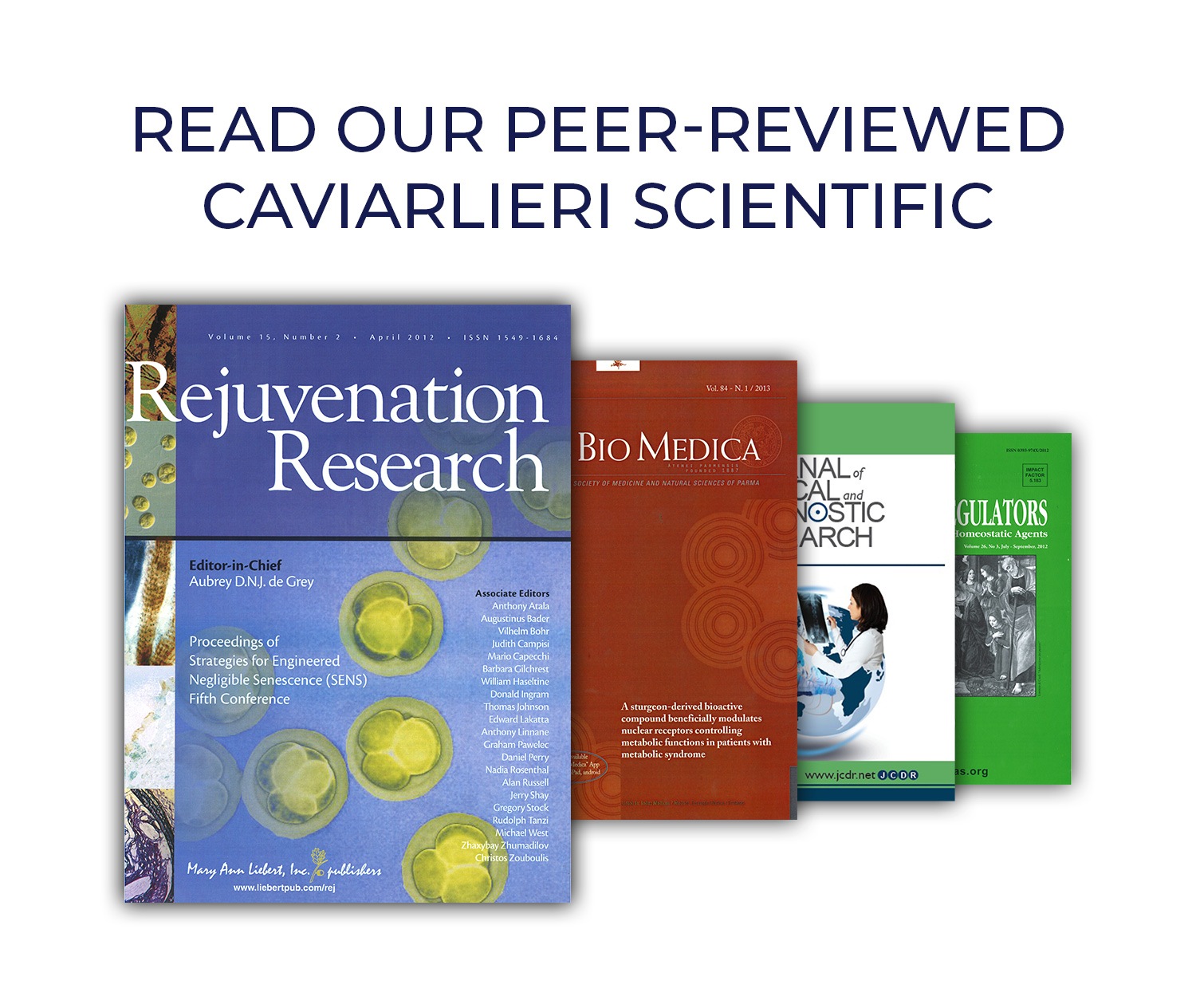Experience the Benefits of Cellular Therapy without Injection – The Swiss Caviar Supplement
Caviarlieri | Published January 13, 2020
Anti-aging is not a modern scientific finding and practice as many of us may think. The quest for solutions to aging woes dates back to ancient times and many countries around the globe have done their own research, formula, and many others. It has been called many names – Elixir of Youth, or Fountain of Youth. It has also long been recognized that anti-aging stems from the basic unit of life which is the cell. That is why the science of Cellular Therapy has been recorded as far back as 1600 B.C. in Egypt which involves implanting animal organs or tissues to contribute to human vigor as an integrative and regenerative medical therapy. In the 1930s, Modern day Cellular Therapy really gained ground and cemented its role as an effective medical therapy compared to conventional medicine. A professor by the name of Dr. Pual Niehans recorded to have treated over 20,000 patients for chronic diseases and failed with using conventional medicine but gained amazing results through cellular therapy. Famous personalities such as Winston Churchill, Pope Pious XII, American President Dwight Eisenhower and Charlie Chaplin have all been under his care. The search did not end there. Up to the present and the future, this quest to remain youthful will not fade.
Non-surgical treatments tend to tackle the underlying cause of our aging. Some non-invasive procedures worth mentioning are such as Traditional Acupuncture, IV Therapy, Cryotherapy, and last but not least…Cellular Therapy.
Let’s talk more about Cellular Therapy. What is it? Cellular Therapy (CT) is much more than your typical beauty procedures. Cellular Therapy is the transplantation of human cells to renew or repair damaged tissue and/or cells. With today’s advanced medicine, Cellular Therapy can also be used in treatment for a variety of diseases and conditions. It is also known as “Regenerative Medicine.” In easier understanding, it is the process of cells reprogramming itself. Cellular Therapy is a developing view that aging is “a reversible epigenetic process.” So, why cellular therapy? Because our cells age – as simple as that. It is believed that Cellular Therapy reverses or delays the deterioration of our cells that could result to aging and diseases.
Cell revitalization and regeneration are the direct results of Cellular Therapy. The tangible and visible benefits are the following:
- Improved strength
- Skin effects – refreshed tone and complexion
- Increased energy levels
- Stabilized mental health
- Strengthened immune system
Cellular Therapy has different preparations and forms and may be derived from animal and human cells. Apart from the fact that these treatments can be very expensive, the methods are invasive and painful such as transplantation and injections. There are potential side effects and complications that also poses as a problem and obstacle to many.
The earlier mentioned methods is why Caviarlieri (caviar supplement) has been produced in the form of soft gels to be taken orally, no injections or other invasive procedures. This is a revolutionary breakthrough in Cellular Therapy because its proven desired effects are achieved through an easier and more convenient route. Caviarlieri is a Caviar Cellular Therapy Supplement manufactured in Switzerland using Swiss Proprietary Cold Extraction Technology, “Cellularix.” Caviarlieri is a powerful treatment that stimulates the body’s “healing powers.” It works in the cellular level by providing essential and active micronutrients to activate cell repair and rejuvenation. Caviarlieri combats the signs of aging by enhancing energy and physical strength. It is easily absorbed by the body, guaranteeing an optimal anti-aging effect.
Key components of Caviarlieri – Swiss Cell Therapy
1. Sturgeon Caviar and Marine peptides
Caviarlieri, swiss cellular therapy is a transformative oral cell nutrition therapy and helps to stimulate the bodies healing powers. It’s key ingredient is a proprietary Cellular Caviar and Marine Complex extracted from sturgeon eggs and deep marine sea fish which can trigger reparation and rejuvenation of damaged cells. Other beneficial ingredients include marine collagen which helps to reinforce elasticity of the skin and plays an extremely important role in the rejuvenation of cartilage.
2. Marine Collagen and Elastin Plus
Collagen although naturally synthesized by our body, decreases as people age while existing collagen may begin to break down. The loss of collagen has a domino effect that can affect several parts of the body such as the skin, bone, joints, and even the immune system. Marine Collagen derived from fish is a type 1 collagen which is the most effective absorbent type of collagen peptides. It is environmentally friendly and sustainable as it uses parts of the fish that are normally thrown away. Marine Collagen is scientifically proven to promote bone strength, improve hair skin and nails, stabilize blood sugar, boost metabolism, and reduces inflammation which helps with joint pain, among many other benefits. Marine Collagen combined with Elastin Plus fortifies the desired effect of rejuvenation and replenishing of lost collagen.
3. Coenzyme Q10
CoQ10 is a natural antioxidant also produced by the body. It is known to improve cardiac health, controlling blood sugar, and reduce oxidative damage which leads to the prevention of most chronic diseases, muscle fatigue, and the deterioration of major organs.
4. Selenium
Selenium plays a big role in the maintenance of the immune system. It helps lower the oxidative stress in your body, reduce inflammation, and enhances immunity capacity. Selenium is important to the Thyroid, prevent mental deterioration, and could lower the risk of certain cancers.
With all those key ingredients, Caviarlieri (swiss cell therapy) is able to penetrate deep into the cells giving a strong and effective amount of benefits with each intake. Each individual may respond to it differently as our bodies are very different. Claimed benefits of Caviarlieri are:
- Significant increase in cellular energy – improves physical strength and stamina
- Management of chronic joint pain – noticeable reduction in joint pain revolving around conditions like Osteoarthritis, Rheumatoid Arthritis, and Fibromyalgia
- Brain enhancement – prevents memory loss, and boosts focus and overall mental health.
- Improved quality of sleep – uplifts mood which in return helps one relax effectively
- Combats metabolic syndrome – controls blood pressure, triglycerides, blood sugar, and HDL cholesterol to decrease the risk of heart attack, stroke, and diabetes.
- Sexual performance – increased libido, stamina, improve sperm quality
- Beauty enhancement – reduces the visible signs of aging, making your skin glow through adequate cellular hydration.
- Anti-inflammatory properties – significantly decelerates the process of cellular aging and prevents the development of degenerative diseases. Further studies will prove that Caviarlieri will demonstrate the reduction of onset and progression of inflammation related diseases.
- Enhance epigenetic – this is using a lifestyle to help modify gene expression rather than alteration of the genes itself, which is impossible.
How Can a Supplement Trigger Cellular Repair?
The ingredients in Swiss Caviarlieri (caviar supplement) follows a meticulous extraction process which allows ingredients to be bio available which means that an active effect occurs when it enters the circulation or when it is introduced into the body. As mentioned earlier instead of injecting this supplement, it is ingested. This oral mechanism of delivery to the make the peptides capable of bringing nutrients into the cells. The synthesis of protein then triggers the repair and renewal of cells to prevent damage. For best results, the Caviarlieri regimen should be taken for 3 to 6 months to allow the sustaining effects of the supplement to be able to take full action. This period is in conjunction with the body’s natural process of repairing itself. It is proven to be safe to be taken for a lengthy period of time.
Caviarlieri is your modern day innovation of the elixir of youth. The quest for feeling youthful both in physical strength and appearance is now available as an easy pill.
Subject
Recent Posts
-
The Amazing Benefits of Highly Polymerized Fish Collagen Peptides with Elastin – Caviarlieri
-
The World’s Most Effective Caviar DNA Extract with Marine Bioactive Peptides
-
Are Supplements effective for Joint Pain?
-
Why Is Sustainable Immunity Important for Your Long-Term Health
-
What is your “Body Age” – Biological Age?




